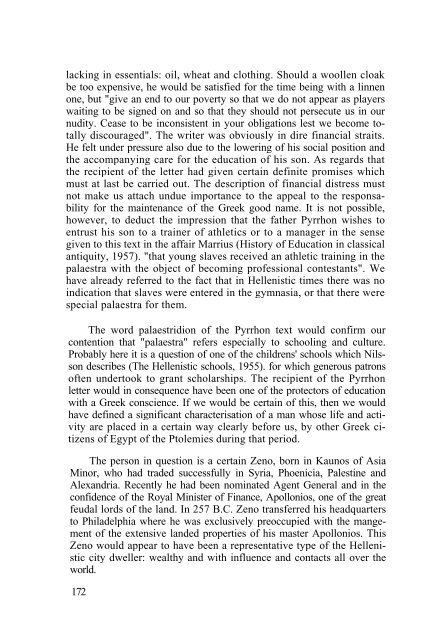download - IOA
download - IOA
download - IOA
You also want an ePaper? Increase the reach of your titles
YUMPU automatically turns print PDFs into web optimized ePapers that Google loves.
lacking in essentials: oil, wheat and clothing. Should a woollen cloak<br />
be too expensive, he would be satisfied for the time being with a linnen<br />
one, but "give an end to our poverty so that we do not appear as players<br />
waiting to be signed on and so that they should not persecute us in our<br />
nudity. Cease to be inconsistent in your obligations lest we become totally<br />
discouraged". The writer was obviously in dire financial straits.<br />
He felt under pressure also due to the lowering of his social position and<br />
the accompanying care for the education of his son. As regards that<br />
the recipient of the letter had given certain definite promises which<br />
must at last be carried out. The description of financial distress must<br />
not make us attach undue importance to the appeal to the responsability<br />
for the maintenance of the Greek good name. It is not possible,<br />
however, to deduct the impression that the father Pyrrhon wishes to<br />
entrust his son to a trainer of athletics or to a manager in the sense<br />
given to this text in the affair Marrius (History of Education in classical<br />
antiquity, 1957). "that young slaves received an athletic training in the<br />
palaestra with the object of becoming professional contestants". We<br />
have already referred to the fact that in Hellenistic times there was no<br />
indication that slaves were entered in the gymnasia, or that there were<br />
special palaestra for them.<br />
The word palaestridion of the Pyrrhon text would confirm our<br />
contention that "palaestra" refers especially to schooling and culture.<br />
Probably here it is a question of one of the childrens' schools which Nilsson<br />
describes (The Hellenistic schools, 1955). for which generous patrons<br />
often undertook to grant scholarships. The recipient of the Pyrrhon<br />
letter would in consequence have been one of the protectors of education<br />
with a Greek conscience. If we would be certain of this, then we would<br />
have defined a significant characterisation of a man whose life and activity<br />
are placed in a certain way clearly before us, by other Greek citizens<br />
of Egypt of the Ptolemies during that period.<br />
The person in question is a certain Zeno, born in Kaunos of Asia<br />
Minor, who had traded successfully in Syria, Phoenicia, Palestine and<br />
Alexandria. Recently he had been nominated Agent General and in the<br />
confidence of the Royal Minister of Finance, Apollonios, one of the great<br />
feudal lords of the land. In 257 B.C. Zeno transferred his headquarters<br />
to Philadelphia where he was exclusively preoccupied with the mangement<br />
of the extensive landed properties of his master Apollonios. This<br />
Zeno would appear to have been a representative type of the Hellenistic<br />
city dweller: wealthy and with influence and contacts all over the<br />
world.<br />
172

















